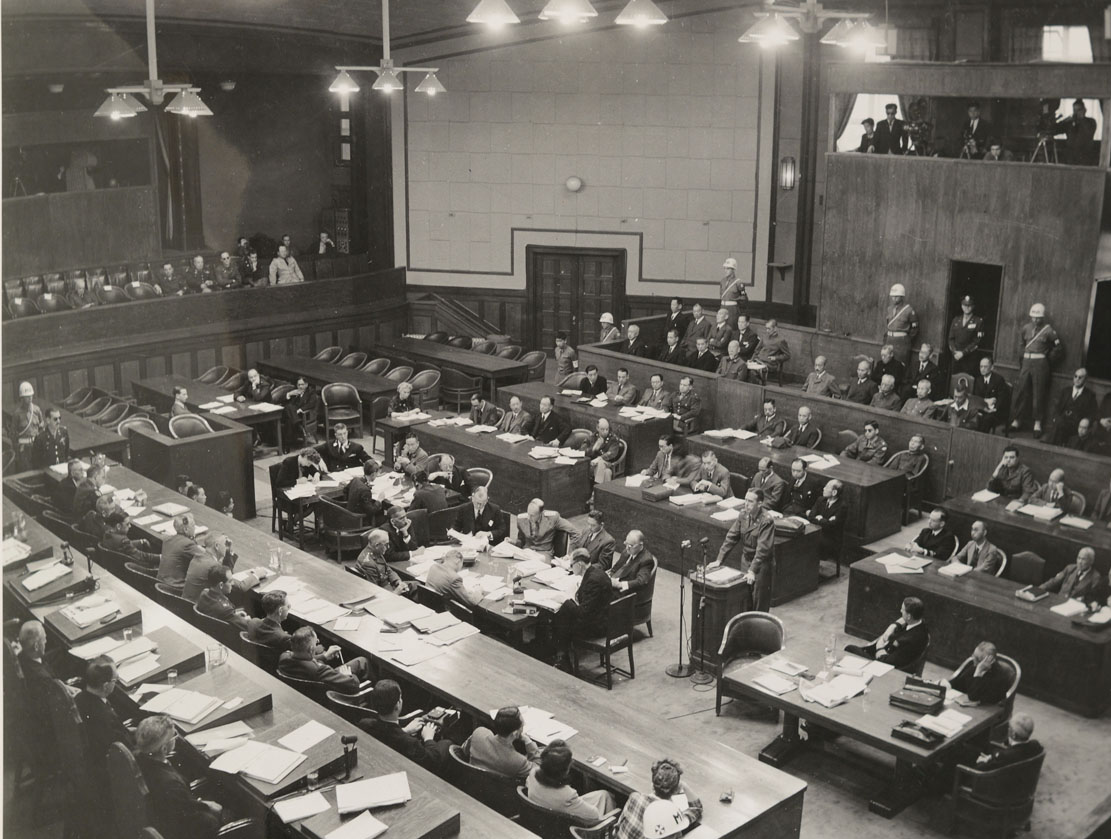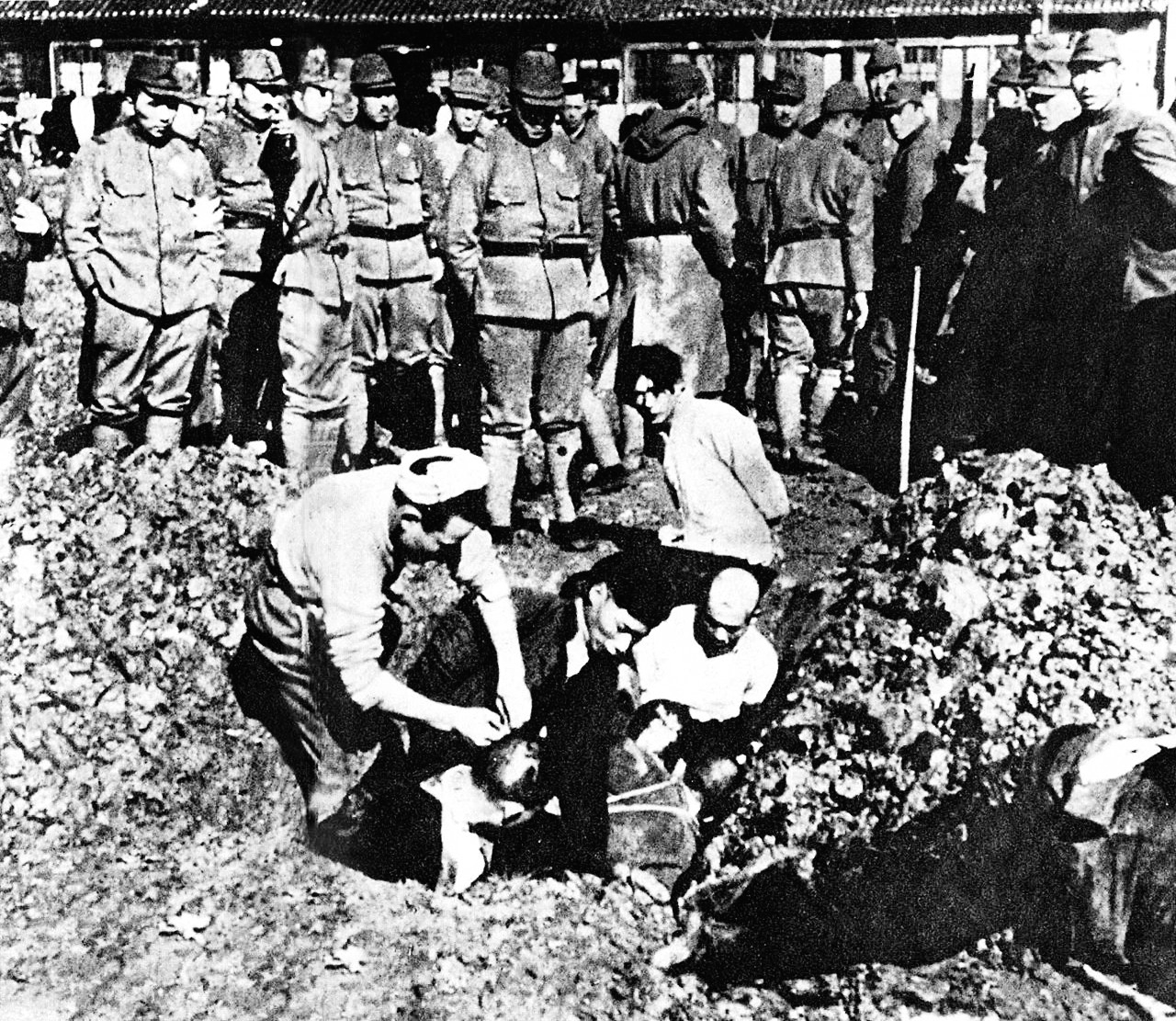|
International Criminal Tribunal
International criminal law (ICL) is a body of public international law designed to prohibit certain categories of conduct commonly viewed as serious atrocities and to make perpetrators of such conduct criminally accountable for their perpetration. The core crimes under international law are genocide, war crimes, crimes against humanity, and the crime of aggression. Classical international law governs the relationships, rights, and responsibilities of states. After World War II, the Charter of the International Military Tribunal and the following Nuremberg trial revolutionized international law by applying its prohibitions directly to individuals, in this case the defeated leaders of Nazi Germany, thus inventing international criminal law. After being dormant for decades, international criminal law was revived in the 1990s to address the war crimes in the Yugoslav Wars and the Rwandan genocide, leading to the establishment of a permanent International Criminal Court i ... [...More Info...] [...Related Items...] OR: [Wikipedia] [Google] [Baidu] |
Treaty Of Versailles
The Treaty of Versailles (french: Traité de Versailles; german: Versailler Vertrag, ) was the most important of the peace treaties of World War I. It ended the state of war between Germany and the Allied Powers. It was signed on 28 June 1919 in the Palace of Versailles, exactly five years after the assassination of Archduke Franz Ferdinand, which led to the war. The other Central Powers on the German side signed separate treaties. Although the armistice of 11 November 1918 ended the actual fighting, it took six months of Allied negotiations at the Paris Peace Conference to conclude the peace treaty. The treaty was registered by the Secretariat of the League of Nations on 21 October 1919. Of the many provisions in the treaty, one of the most important and controversial was: "The Allied and Associated Governments affirm and Germany accepts the responsibility of Germany and her allies for causing all the loss and damage to which the Allied and Associated Governments and the ... [...More Info...] [...Related Items...] OR: [Wikipedia] [Google] [Baidu] |
International Criminal Tribunal For Rwanda
The International Criminal Tribunal for Rwanda (ICTR; french: Tribunal pénal international pour le Rwanda; rw, Urukiko Mpanabyaha Mpuzamahanga Rwashyiriweho u Rwanda) was an international court established in November 1994 by the United Nations Security Council in Resolution 955 in order to judge people responsible for the Rwandan genocide and other serious violations of international law in Rwanda, or by Rwandan citizens in nearby states, between 1 January and 31 December 1994. The court eventually convicted 61 individuals at a cost of $1.3 billion. In 1995, it became located in Arusha, Tanzania, under Resolution 977. From 2006, Arusha also became the location of the African Court on Human and Peoples' Rights. In 1998 the operation of the tribunal was expanded in Resolution 1165. Through several resolutions, the Security Council called on the tribunal to complete its investigations by end of 2004, complete all trial activities by end of 2008, and complete all work in 2012. ... [...More Info...] [...Related Items...] OR: [Wikipedia] [Google] [Baidu] |
Rwanda
Rwanda (; rw, u Rwanda ), officially the Republic of Rwanda, is a landlocked country in the Great Rift Valley of Central Africa, where the African Great Lakes region and Southeast Africa converge. Located a few degrees south of the Equator, Rwanda is bordered by Uganda, Tanzania, Burundi, and the Democratic Republic of the Congo. It is highly elevated, giving it the soubriquet "land of a thousand hills", with its geography dominated by mountains in the west and savanna to the southeast, with numerous lakes throughout the country. The climate is temperate to subtropical, with two rainy seasons and two dry seasons each year. Rwanda has a population of over 12.6 million living on of land, and is the most densely populated mainland African country; among countries larger than 10,000 km2, it is the fifth most densely populated country in the world. One million people live in the Capital city, capital and largest city Kigali. Hunter-gatherers settled the territory in the St ... [...More Info...] [...Related Items...] OR: [Wikipedia] [Google] [Baidu] |
International Criminal Tribunal For The Former Yugoslavia
The International Criminal Tribunal for the former Yugoslavia (ICTY) was a body of the United Nations that was established to prosecute the war crimes that had been committed during the Yugoslav Wars and to try their perpetrators. The tribunal was an ''ad hoc'' court located in The Hague, Netherlands. It was established by Resolution 827 of the United Nations Security Council, which was passed on 25 May 1993. It had jurisdiction over four clusters of crimes committed on the territory of the former Yugoslavia since 1991: grave breaches of the Geneva Conventions, violations of the laws or customs of war, genocide, and crimes against humanity. The maximum sentence that it could impose was life imprisonment. Various countries signed agreements with the UN to carry out custodial sentences. A total of 161 persons were indicted; the final indictments were issued in December 2004, the last of which were confirmed and unsealed in the spring of 2005. The final fugitive, Goran Hadžić, ... [...More Info...] [...Related Items...] OR: [Wikipedia] [Google] [Baidu] |
United Nations Security Council
The United Nations Security Council (UNSC) is one of the Organs of the United Nations, six principal organs of the United Nations (UN) and is charged with ensuring international security, international peace and security, recommending the admission of new UN members to the United Nations General Assembly, General Assembly, and approving any changes to the UN Charter. Its powers include establishing peacekeeping operations, enacting international sanctions, and authorizing military action. The UNSC is the only UN body with the authority to issue binding United Nations Security Council resolution, resolutions on member states. Like the UN as a whole, the Security Council was created after World War II to address the failings of the League of Nations in maintaining world peace. It held its first session on 17 January 1946 but was largely paralyzed in the following decades by the Cold War between the United States and the Soviet Union (and their allies). Nevertheless, it authorized ... [...More Info...] [...Related Items...] OR: [Wikipedia] [Google] [Baidu] |
Bosnia And Herzegovina
Bosnia and Herzegovina ( sh, / , ), abbreviated BiH () or B&H, sometimes called Bosnia–Herzegovina and often known informally as Bosnia, is a country at the crossroads of south and southeast Europe, located in the Balkans. Bosnia and Herzegovina borders Serbia to the east, Montenegro to the southeast, and Croatia to the north and southwest. In the south it has a narrow coast on the Adriatic Sea within the Mediterranean, which is about long and surrounds the town of Neum. Bosnia, which is the inland region of the country, has a moderate continental climate with hot summers and cold, snowy winters. In the central and eastern regions of the country, the geography is mountainous, in the northwest it is moderately hilly, and in the northeast it is predominantly flat. Herzegovina, which is the smaller, southern region of the country, has a Mediterranean climate and is mostly mountainous. Sarajevo is the capital and the largest city of the country followed by Banja Luka, Tu ... [...More Info...] [...Related Items...] OR: [Wikipedia] [Google] [Baidu] |
International Military Tribunal For The Far East
The International Military Tribunal for the Far East (IMTFE), also known as the Tokyo Trial or the Tokyo War Crimes Tribunal, was a military trial convened on April 29, 1946 to try leaders of the Empire of Japan for crimes against peace, conventional war crimes, and crimes against humanity leading up to and during the Second World War. It was modeled after the International Military Tribunal (IMT) formed several months earlier in Nuremberg, Germany to prosecute senior officials of Nazi Germany. Following Japan's defeat and occupation by the Allies, the Supreme Commander of the Allied Powers, United States General Douglas MacArthur, issued a special proclamation establishing the IMTFE. A charter was drafted to establish the court's composition, jurisdiction, procedures; the crimes were defined based on the Nuremberg charter. The Tokyo War Crimes Tribunal was composed of judges, prosecutors, and staff from eleven countries that had fought against Japan: Australia, Canada, Chin ... [...More Info...] [...Related Items...] OR: [Wikipedia] [Google] [Baidu] |
Japanese War Crimes
The Empire of Japan committed war crimes in many Asian-Pacific countries during the period of Japanese militarism, Japanese imperialism, primarily during the Second Sino-Japanese War, Second Sino-Japanese and Pacific Wars. These incidents have been described as an "Asian Holocaust". Some war crimes were committed by Japanese military personnel during the late 19th century, but most were committed during the first part of the Shōwa (1926–1989), Shōwa era, the name given to the reign of Emperor of Japan, Emperor Hirohito. Under Emperor Hirohito, the Imperial Japanese Army (IJA) and the Imperial Japanese Navy (IJN) perpetrated numerous war crimes which resulted in the deaths of millions of people. Estimates of the number of deaths range from three to 30 million through Nanjing Massacre, massacres, Unit 731, human experimentation, Vietnamese famine of 1945, starvation, and Slavery in Japan#World War II, forced labor directly perpetrated or condoned by the Japanese military and go ... [...More Info...] [...Related Items...] OR: [Wikipedia] [Google] [Baidu] |
Nuremberg Tribunal
The Nuremberg trials were held by the Allies against representatives of the defeated Nazi Germany, for plotting and carrying out invasions of other countries, and other crimes, in World War II. Between 1939 and 1945, Nazi Germany invaded many countries across Europe, inflicting 27 million deaths in the Soviet Union alone. Proposals for how to punish the defeated Nazi leaders ranged from a show trial (the Soviet Union) to summary executions (the United Kingdom). In mid-1945, France, the Soviet Union, the United Kingdom, and the United States agreed to convene a joint tribunal in Nuremberg, with the Nuremberg Charter as its legal instrument. Between 20 November 1945 and 1 October 1946, the International Military Tribunal (IMT) tried 21 of the most important surviving leaders of Nazi Germany in the political, military, and economic spheres, as well as six German organizations. The purpose of the trial was not just to convict the defendants but also to assemble irrefutable evide ... [...More Info...] [...Related Items...] OR: [Wikipedia] [Google] [Baidu] |
Empire Of Japan
The also known as the Japanese Empire or Imperial Japan, was a historical nation-state and great power that existed from the Meiji Restoration in 1868 until the enactment of the post-World War II 1947 constitution and subsequent formation of modern Japan. It encompassed the Japanese archipelago and several colonies, protectorates, mandates, and other territories. Under the slogans of and following the Boshin War and restoration of power to the Emperor from the Shogun, Japan underwent a period of industrialization and militarization, the Meiji Restoration, which is often regarded as the fastest modernisation of any country to date. All of these aspects contributed to Japan's emergence as a great power and the establishment of a colonial empire following the First Sino-Japanese War, the Boxer Rebellion, the Russo-Japanese War, and World War I. Economic and political turmoil in the 1920s, including the Great Depression, led to the rise of militarism, nationa ... [...More Info...] [...Related Items...] OR: [Wikipedia] [Google] [Baidu] |


.jpg)



